必修三 Unit 3 The Million Pound Bank-note--Reading 课件(共84张PPT)
文档属性
| 名称 | 必修三 Unit 3 The Million Pound Bank-note--Reading 课件(共84张PPT) | 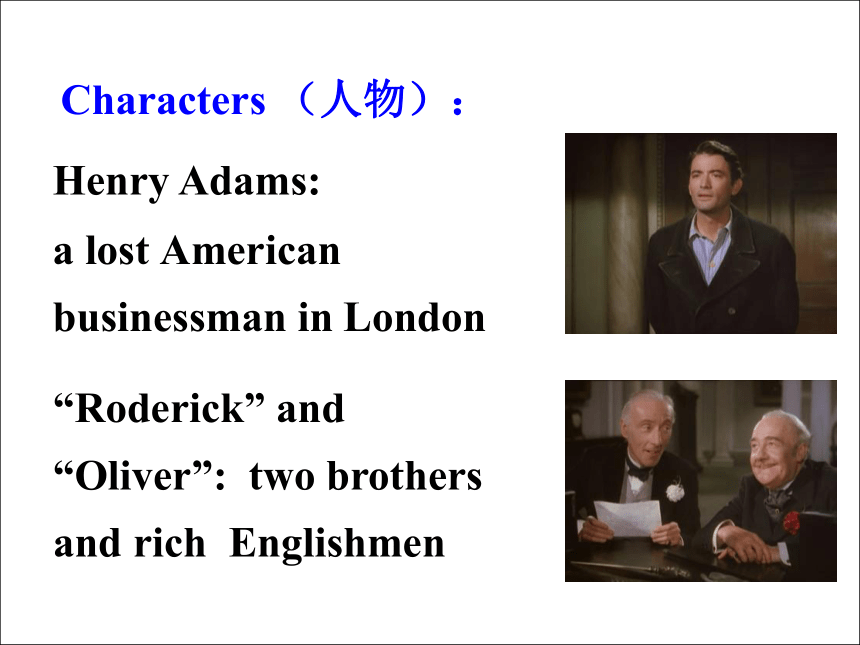 | |
| 格式 | zip | ||
| 文件大小 | 1.1MB | ||
| 资源类型 | 教案 | ||
| 版本资源 | 人教版(新课程标准) | ||
| 科目 | 英语 | ||
| 更新时间 | 2018-11-15 06:41:22 | ||
图片预览

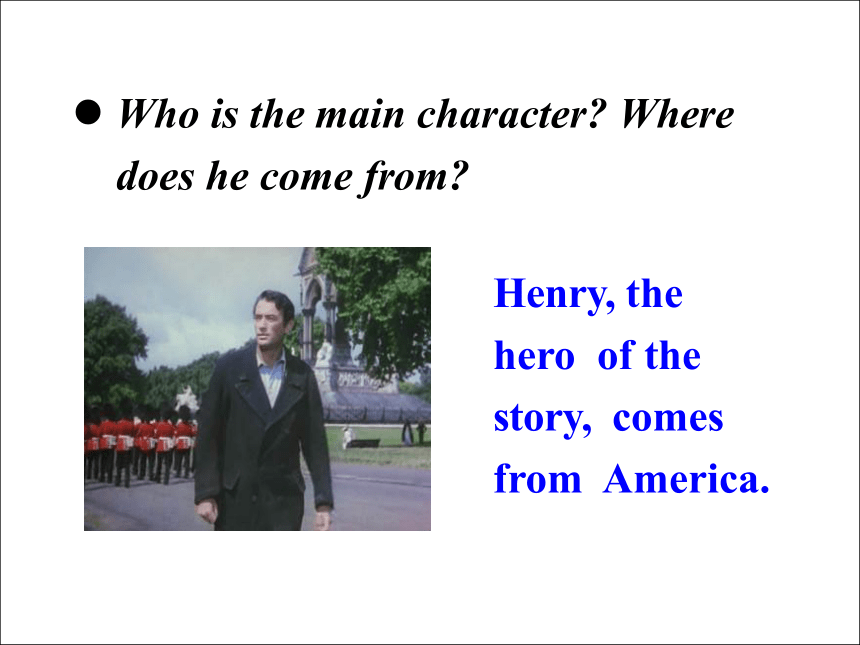
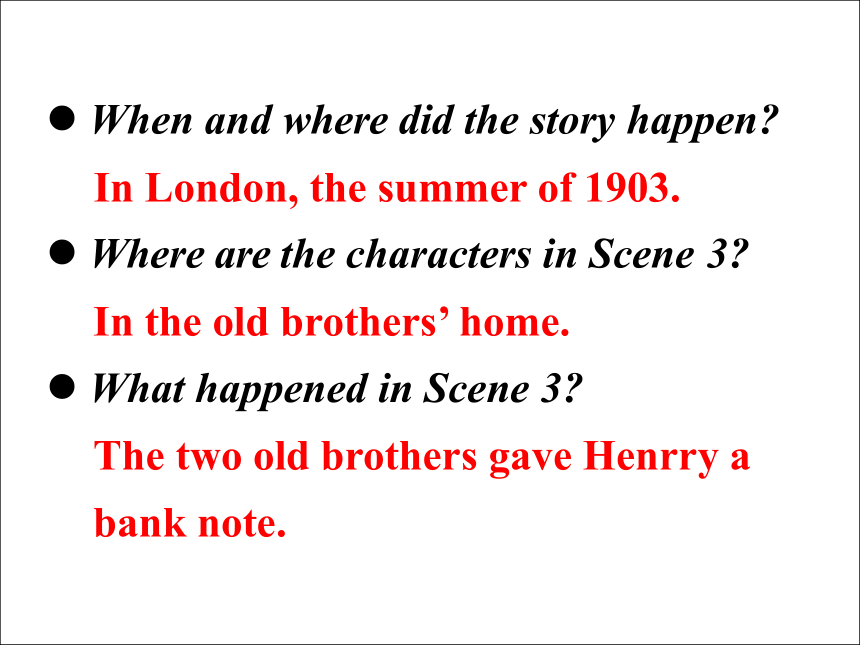
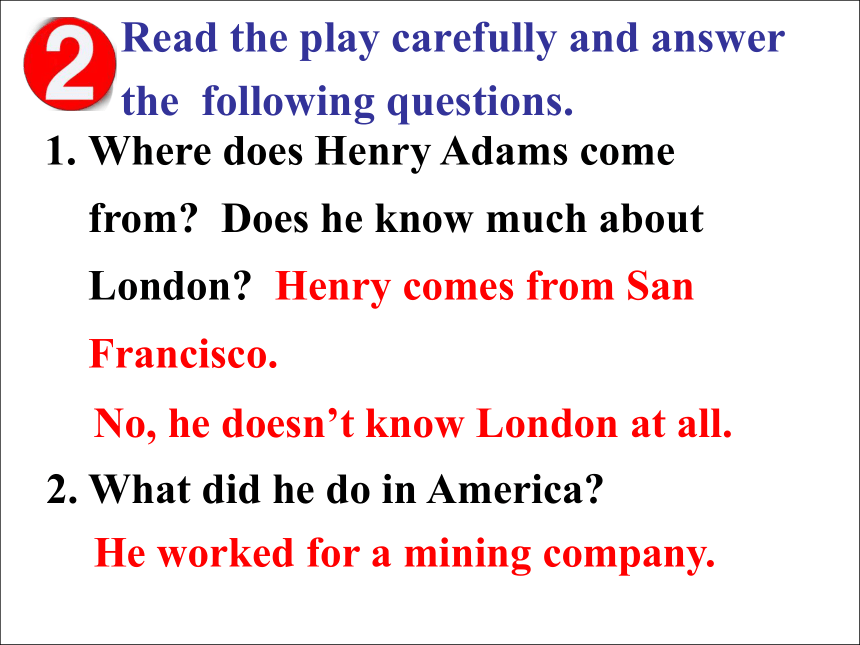
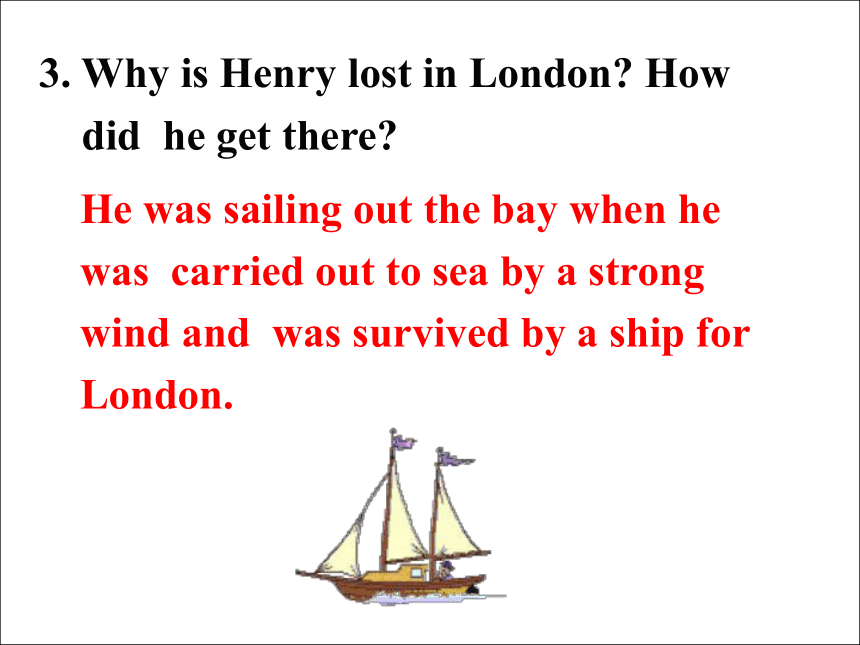
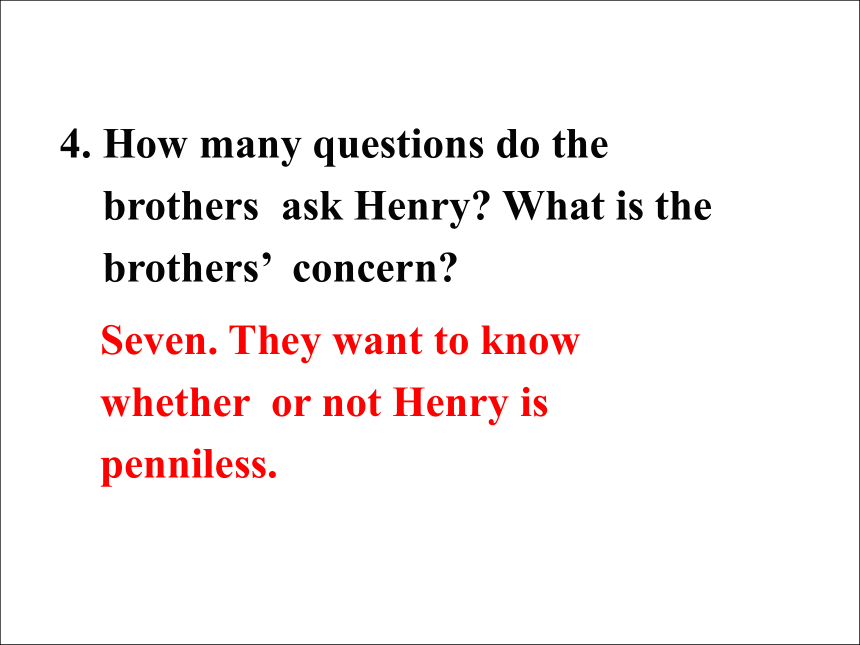
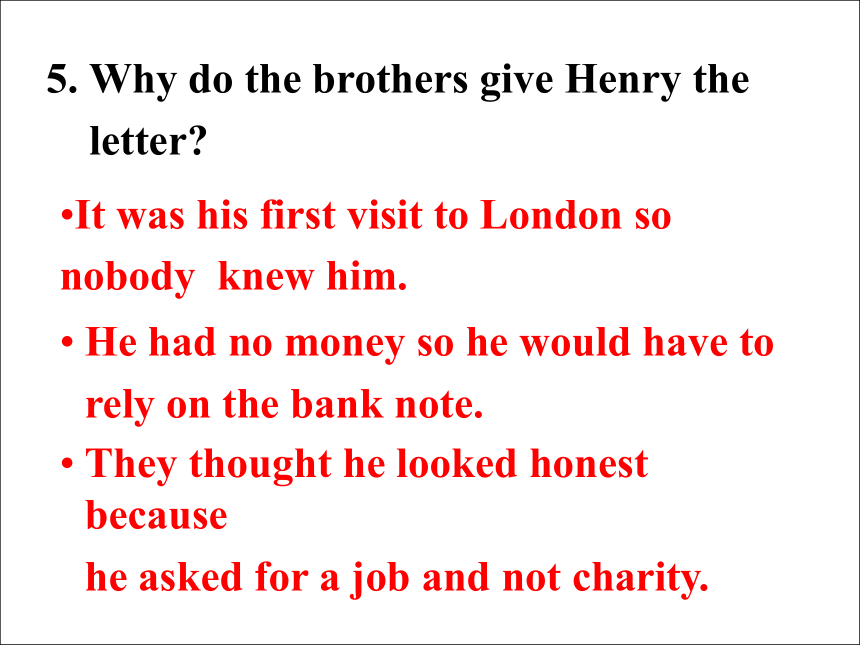
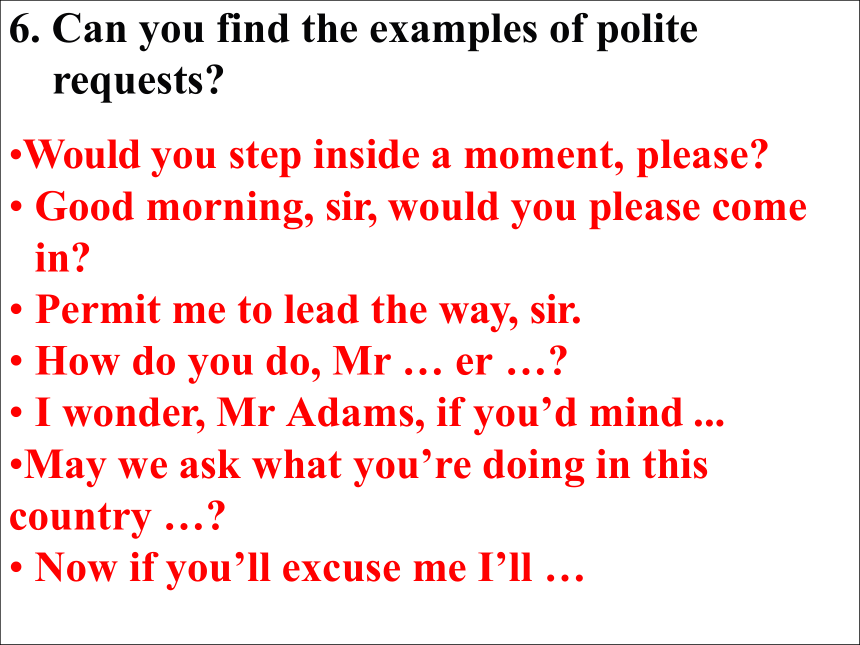
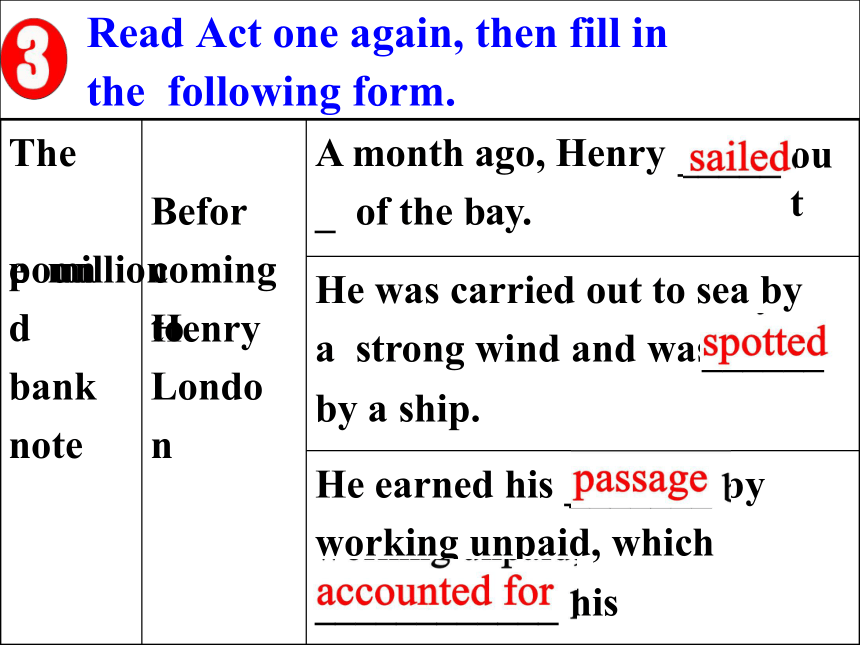
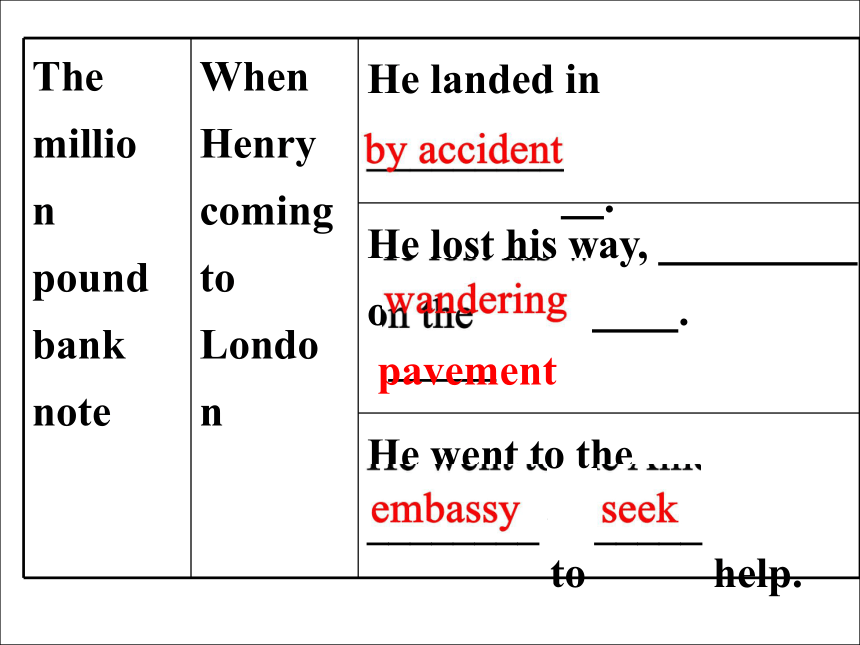
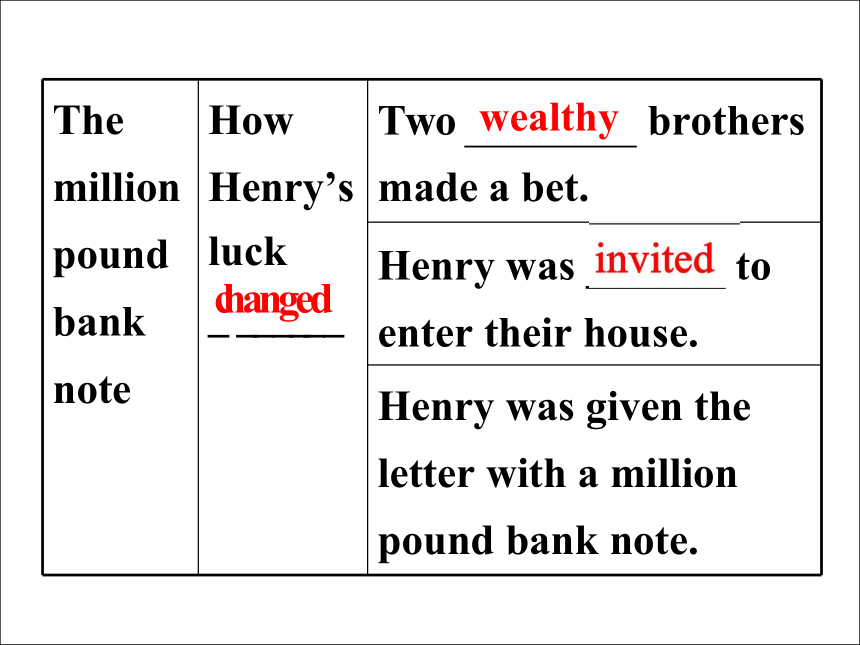
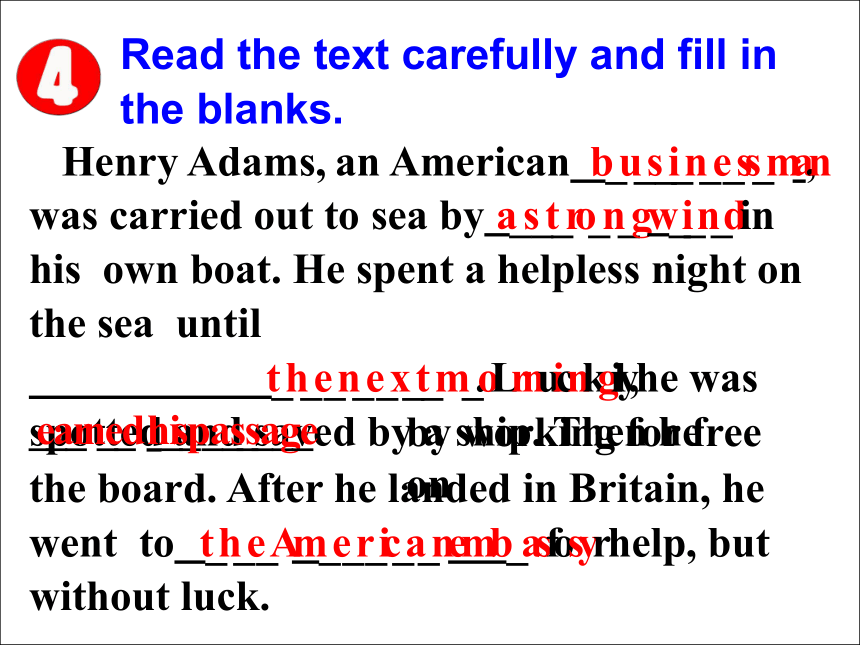
文档简介
课件84张PPT。Characters (人物):
Henry Adams:
a lost American businessman in London
“Roderick” and “Oliver”: two brothers and rich EnglishmenWho is the main character? Where does he come from?
Henry, the hero of the story, comes from America.When and where did the story happen?
In London, the summer of 1903.
Where are the characters in Scene 3?
In the old brothers’ home.
What happened in Scene 3?
The two old brothers gave Henrry a bank note.Where does Henry Adams come from? Does he know much about London? Henry comes from San Francisco.
No, he doesn’t know London at all.
What did he do in America?
He worked for a mining company.Read the play carefully and answer the following questions.3. Why is Henry lost in London? How did he get there?
He was sailing out the bay when he was carried out to sea by a strong wind and was survived by a ship for London.4. How many questions do the brothers ask Henry? What is the brothers’ concern?Seven. They want to know whether or not Henry is penniless.Why do the brothers give Henry the letter?
It was his first visit to London so nobody knew him.
He had no money so he would have to rely on the bank note.
They thought he looked honest because
he asked for a job and not charity.6. Can you find the examples of polite requests?
Would you step inside a moment, please?
Good morning, sir, would you please come in?
Permit me to lead the way, sir.
How do you do, Mr … er …?
I wonder, Mr Adams, if you’d mind ...
May we ask what you’re doing in this country …?
Now if you’ll excuse me I’ll …pound bank noteThe Before million Henrycoming to London_____outA month ago, Henry _ of the bay._________________________He was carried out to sea by a strong wind and was _
by a ship.
He earned his _ by working unpaid, which
his appearance.Read Act one again, then fill in the following form.The million pound bank noteWhen Henry coming to London_________He landed in Britain
.n the __________________He went to the American
to help.He lost his way,
o .
pavement______by working for free onRead the text carefully and fill in the blanks.
Henry Adams, an American b_u_s_i_n_e_ss_ma,n
was carried out to sea by a_s_t_ro_n_g w_i_n_d in his own boat. He spent a helpless night on the sea until t_h_e_n_e_x_t_m_.oLrnuicnkgily, he was spotted and saved by a ship. Then he_e_a_rn_e_d h_is_p_a_s_s_a_g_e the board. After he landed in Britain, he went to t_h_e_Am_e_r_ic_a_n emb_asfosyr help, but without luck.One day, he _wa_s _w_a_n_d_e_r_in_g_ on the street when he was called into a large house owned by two old Englishmen, who asked him a few questions. Henry answered that he was looking for inaLjonbdon and asked whether they could offer any. They didn’t answer directly but gave Henry
wahleicttherthey said contained a sum of money.
They also asked Henry to promise
n_o_t_t_o uonpteinl 2ito’clock. Henry thought it was but acceptedsililty.What do you think of Henry?Tells the truth to the brothers.
It is my first trip here.
Well, to be honest, I have none. (no money) Well, I can’t say that I have any plans.Wants work but not charity.
I earned my passage by working as an unpaid hand.
Could you offer me some kind of work here?
I don’t want your charity, I just want an honest job.Well, it may seem luck to you but not to me. If this is your idea of some kind of joke, I don’t think it’s very funny.
Now, if you’ll excuse me, I think I’ll be on my way.What kind of persons do you think Oliver and Roderick are?Oliver and Roderick:
rich (servants and not worrying about giving a stranger a million pound bank- note), mischievous (prepared to bet one million pounds just for a bit of fun), good judges of character (they see Henry is honest and proud)百万英镑
第一幕,第三场
旁白:1903年的夏天,一对年老又富有的兄弟, 罗德里克和奥利弗,打了一个赌。奥利弗认为, 一个人靠一张百万英镑的钞票在伦敦能活一个月 他的兄弟罗德里克对此表示怀疑。这时,他们看 见一个身无分文的年轻人在他们的房子外面的人 行道上游荡。他叫亨利,亚当斯,一个美国商人 在伦敦迷了路,不知道该怎么办。
罗德里克:年轻人,请你进来一会,好吗? 亨利:先生,你叫谁啊?是叫我吗?
罗德里克:是的,就是你。
奥利弗:从你左侧的前门进来。 亨利:(仆人给他打开门)谢谢。仆人:早上好,先生,请进。先生,请让 我来带路吧。
奥利弗:(亨利走进来)谢谢你,詹姆斯,
没你的事情了。
罗德里克:你好,先生,你贵姓? 亨利:亚当斯,亨利 .亚当斯
奥利弗:来,请坐,亚当斯先生。
亨利:谢谢
罗德里克:你是美国人? 亨利:是的,从旧金山来。
罗德里克:你对伦敦熟悉吗?
亨利:一点也不熟悉,这是我第一次来伦敦罗德里克:亚当斯先生,不知道你是否介 意我们问几个问题?
亨利:不介意,请问吧。
罗德里克:可不可以问问,你在这个国家 要干点儿什么?你的计划又是什么呢? 亨利:嗯,谈不上有什么计划,我希望能 找到工作,事实上,我在英国上岸纯属偶 然。
奥利弗:这怎么可能呢?
亨利:嗯,你看,在美国的时候,我有自 己的船。大约1个月前,我开船驶出了海 湾……(他的眼睛盯着座子上两兄弟剩下 的残羹剩饭)奥利弗:往下说啊。
亨利:哦,好的。嗯,傍晚时分我发现我被一阵大风刮 到海上去了。这都是我的错。我不知道能否活到早晨。 第二天早上,我正感到绝望的时候,一艘海船发现了我 奥利弗:正是那艘船把你带到了英国。
亨利:是的。事实上我靠做义工来顶替船费,这就是我 为什么衣冠不整的原因了。我上美国大使馆求助,但
是……(兄弟两相顾而笑)
罗德里克:嗯,这一点你倒不必担心,这还是优点呢。 亨利:对不起,先生,你的话我没有听懂。
罗德里克:耐心点儿,亚当斯先生。如果你不介意,我 能不能问问,你手头上有多少钱?
亨利:嗯,老实说,我一分钱都没有了。
奥利弗:(高心地)老兄,真走运!真有运气!(鼓起 掌来)亨利:嗯,这对你们来说可能是运气,但对我来 说可不是。事实上,正好相反。如果你们认为这 是一个笑话,我可不觉得好笑。(亨利起身准备 走)好了,请原谅,我想我该上路了。
罗德里克:亚当斯先生,请别走。你千万不要以 为我们不在意你的感受。奥利弗,把信给他。 奥利弗:是,拿信。(从座上把信拿起来,像送 礼品一样递给亨利)给你信。
亨利:(小心翼翼地接过信)是给我的吗?
罗德里克:是给你的。(亨利要拆信)啊,别拆 你不要拆,现在不是时候,到两点钟你才能打开
亨利:奥,这真可笑。罗德里克:这不可笑,这里边有钱呢。(叫仆人 詹姆斯?
亨利:奥,不,我不需要你们的施舍,我只要一 份老老实实的工作。
罗德里克:我知道你工作是很卖力的,这正是我 们给你这封信的原因。詹姆斯,请送亚当斯先生 出去。
奥利弗:祝你好远,亚当斯先生。
亨利:嗯,怎么不给我讲讲,这究竟是怎么回事 呢?
罗德里克:你很快就会明白的,(看着钟)一个 半小时以后。
仆人:请这边走,先生。
罗德里克:亚当斯先生,两点钟以前不要拆信, 答应吗?
亨利:答应。再见!))))1 F (fact) or O (Opinion)
Henry wants to find a job in London. (
Henry is given an envelope by the two brothers. (
Henry is an unlucky young man. (
The servant is called James. (
Henry is foolish to go and meet the two brothers. ()Comprehending2 Read Act 1, Scene 3 carefully and find all the examples of polite requests in it. Then rewrite them in informal languageWould you step inside a moment, please?
Come in, please.
Good morning, sir. Would you please come in?
Hello. Please come in.
Permit me to lead the way, sir. Let me show you the way.How do you do, Mr…er…?
Hello Mr….
I wonder, Mr Adams, if you’d mind…. Mr Adams, is it OK if …?
6 May we ask what you’re doing in this country…?
Why are you in England?
7 Now if you’ll excuse me…. Please excuse me.3 Describe how Henry’s feelings change.What he says or How he feels does1 Before he entered the brothers’ housewandering round LondonMiserable, unhappy, anxious2 When he introduced himselfbehaves politely and answers questions fullycurious why he has been asked to go into the house3 When the brother asked his plansadmits his problems and asks for work; explains his situationhopeful that he might find a solution to his troubles4 When he tells them how he reached London by shipblames himself for his carelessness; remembers how hungry he was when he sees the food on the tablegrateful and felt himself rescuedseem happy that he has no money5 When they replies angrilyangry, irritatedgive him the envelope envelope straightaway6 When they wants to open the irritated that hecannot open the envelope at oncetell him there is money in it7 When they explains he wantsa job not charityunhappy to be given money rather than working for it8 Before he leaves the house2pmAgrees not to interested and open the letter till curious4 Discuss these questions in groups.1 Why do you think that the brothers chose Henry for their bet?
It was his first visit to London so nobody knew him.
He had no money so he would have to rely on the bank note
They thought he looked honest because he asked for a job and not charity.2 What kind of person do you think Henry is?
Why do you think so?
Overconfident – He thought he could sail better than he could
Independent – He worked for his passage as an unpaid hand to England
Honest – He told the truth to the brothers.
Hard-working – He wanted work but not charity3 Listen to the tape. Compare Henry's language with the two brothers' language. What do you notice?NameWay of Evidence speakingHenry directtells Oliver and Roderick his name without question
gives them his difficulties though they are strangers
questions why he must wait before opening the letterHenry idiomatic 1 go right ahead = carry on
back home =at home
I’d just about given myself up for lost =I thought I’d die 4 If this is your idea of some
kind of joke = Is this a joke?
5 why don’t you explain
what this is all about? = Why?Oliver Formal 1 I wonder, Mr Adams, ifand and polite you’d mind us asking a few Roderi
ckquestions.
2 May we ask what you’re doing in this country and what your plans are?
3 If you don’t mind, may I ask you how much money you have?6 Try to retell what happens in Act I, Scene 3 in your own words.
Henry is lost in London. He has no money and is wondering what to do. Suddenly a door opens and two brothers invite him inside the house. They ask him some questions and then give him an envelope and tell him not to open it till 2pm. They do, however, suggest that it contains money.
Henry promises to wait till 2 pm before opening the letter.1. He was brought up in Hannibal, ...
bring up意为“抚养,养育,教养,提出”。
e.g. Her parents died when she was a baby and she was brought up by her aunt.
These are matters that you can bring up in committee.Language points[拓展] 含bring的短语
bring about 导致, 引起
bring ... to an end 结束, 终止
bring back 拿回来, 使恢复;
bring back to life 使复生, 使苏醒, 使生动, 使 活泼
bring down 降低,压低
bring in 引进,引来2. ... Roderick and Oliver, have made a bet. bet n.
(1) 赌博
make a bet 打赌
e.g. Let’s make a bet on the next election.
咱们赌下次大选好吗? Bet is bet. I will pay you. 愿赌服输,我会给你钱的.(2) (金钱等) 赌注
a heavy bet
v. (1) 打赌, 赌博
e.g. Mrs. Black spent all her money betting on horses.
布莱克夫人把她所有的钱都花在了赌 马上。(2) I bet … = (informal) I’m certain …
我肯定……
e.g. I bet he’s gone swimming -- he loves it.
我敢肯定他去游泳了,他喜爱这项运动。
bet – bet – bet – bettinghave a bet win/lose a bet打赌
打赌赢/输了accept/take up a bet 同意与……打赌bet sb. sth. bet on sth.与某人打……的赌 对某事打赌make a bet on sth. with sb.
和某人在……上打赌have a bet on … do sth. for a bet在……上下赌注 为打赌而做某事3. … they see a penniless young man wandering on the pavement outside their house.
wander v. & n.
v. (1) 游荡/闲逛; 漫步/游sp.
在小城闲逛 _w_a_n_d_e_r_i_n_t_h_e_s_m_a_l_l_t_o_w_n
漫游世界 _w_a_n_d_e_r_t_h_e_wo_rl_d
He told us that we could w_a_n_d_e_r_a_r_o_u_n_d at will. (随便逛逛)(2) 迷路,走失
e.g. The traveler wandered for some time in the fog.
(3) 走神
e.g. My attention/mind wandered.
n. 漫游,闲逛
go for / take a wander 去溜达4. Permit me to lead the way, sir.
permit作动词,意为“许可,允许,准 许”,后可跟名词、代词、动词-ing形
式或带不定式的复合结构,也可用于 被动结构;permit后不跟宾语时,多用 于状语中。
e.g. The moon permitted me to see a little way into the distance.The use of mobile phones is not permitted inside the aircraft.
If time permits / Time permitting, we will listen to your questions.[词组]
permit sb. to do sth. 允许某人做某事permit doing sth. permit sb. sth.允许做某事 允许某人某事permit sb. in / near sth.
允许某人进入某处/靠近某物
a fishing / work / residence / parking / travel / export permit
捕捞/工作/居住/停车/旅游/出口许可证5. Go right ahead.
go ahead 主要有以下三种含义:
① 走在前面;先走。
e.g. You go ahead and tell them that we will be there shortly.
② 发生;进行。
e.g. The building of the new school will go ahead as planned.
③ 主要用于口语中,表示“可以;往下说;
开始吧”等,高考主要考查这一用法。e.g.
⑴ — Would you mind if I borrowed your bike?
— Go ahead, please.
(2) — May I start?
— Yes, go ahead.6. His eyes stare at what is left of the brother’s dinner on table.
stare v. 瞪着眼睛凝视
e.g. It’s rude to stare at people. 盯着人看是没有礼貌的。 They all stared in amazement. 他们都惊讶得瞪大了眼睛。
Mary stared at him hard and eventually shamed him into giving up his seat to the old lady.7. ... when I was spotted by a ship. spot n. & v.
[对号入座]
阅读下列句子,在括号内填出与spot相对 应的词性及含义。
v. 发现;认出 n. ①斑点 ②污点 ③地点
I’ve just spotted a mistake on the front cover. ( v. 发现 )
Some people spotted smoke coming out
of the window. ( v. 发现 )His jacket was covered with spots of mud. ( n. ②)
Why do they want to build a house on this particular spot? (n. ③)
Now she wore a white dress with black spots on it. ( n. ①)[常见搭配]
on the spot 当场;当下
in a (tight) spot 处于困境
put sb. on the spot(提出难题)使某人 尴尬,使某人为难
be spotted with 满是……斑点8. The fact is that I earned my passage by working as an unpaid hand, which accounts for my appearance.
passage n. 船费(包括食宿)
e.g. Her grandfather had worked his passage to America.
她的祖父一路在船上打工支付船费
来到美国。account for 导致;作出解释
e.g. The traffic jam may have accounted for his being late.
Tom’s mother was angry because he couldn’t account for the three hours between his last class and his arrival at home.on account of
因为, 由于
take into account = take account of
考虑, 重视
on all accounts
无论如何
on no account
绝不[即学即练]
用account (for) 的适当形式完成下列句子。
His illness _a_c_c_o_u_n_ts fo_r his absence from school.
She gave him a full a_cc_o_u_n_t of her conversation with the doctor.had a wonderful time.
A. Above all
B. What’s moreC. As a resultD. On the contrary9. On the contrary, in fact.
on the contrary意为“正相反,与此相反”。
e.g. — Have you nearly finished?
— On the contrary, I have only just begun.
[考例] He seems to be giving the impression that he didn’t enjoy himself in Paris. D_, he10. If this is your idea of some kind of joke, I don’t think it’s very funny.
如果你们认为这是一个笑话,我可不 觉得很可笑。
[点拨] 此句是一个主从复合句。主句 为I don’t think ...;从句是if引导的条件状语从句,即If this is your idea of some kind of joke; 另外, I don’t think称之为否定前移或否 定转移,即:当主句中含有think, believe, suppose, expect, imagine等谓语 动词时,后面宾语从句中的否定词not 往往转移到主句谓语动词之前。如:
I don’t believe they will win the game.
我相信他们不会赢得这场比赛。
I don’t think it is fair.
我认为那不合理。
She doesn’t suppose that we have finished the job.
她认为我们还没有完成工作。I. 根据下列各句句意及所给单词的首字母 或汉语提示, 写出该单词的正确形式。
1. You should not park your car on the(人行道)._p_a_v_e_m_e_n_t2. Photography will not be p_e_r_m_i_tt_e_d (允 许) inside the courtroom.____The secret of a good relationship is to accept other persons’ ( 过 错 ), and not to try to make them change.
You should s_ee_k_ (寻求) advice from your lawyer on this matter.
Spain is our favorite holiday s_s_p_o_t_ and we all like traveling there.He w_a_n_d_er_e_d around the mall for half an hour as if he had nothing else to do.
Her p_a_ti_e_n_c_e_ (耐性) made her the best nurse in the hospital.
We met the officials of the emb_a_s_sy_
(大使馆) at dinner that same evening.用所给短语的适当形式完成下列句子。
make a bet; go ahead; by accident; stare at; account for; on the contrary
Don’t _s_ta_r_e_a_t me like that. It’s not my fault anyway.
He could not _a_c_c_o_u_n_t_f_o_r_ his absence from school.He _m_a_d_e a_b_e_t_ that he would win the game.
It doesn’t seem ugly to me;
_o_n_t_h_e_c_o_n_t_ra_r_y , I think it’s rather beautiful.
I don’t know whether he did it
obrybayccdiedseingtn.
If you want to take a shower, just
_g_o_a_h_e_a_d_ and take one.Find the correct word for each of the following meanings.
f_a_u_l_t mistake
p_e_rmit to allow something to happen
au_t_h_o_r someone who writes booksthe place wheresomeone was born_s_e_e_k to try to find or get something
_e_n_v_el_o_p_e_ a thin paper cover for a letter6. b_i_r_th_p_l_a_ce_b_u_si_n_e_s_sma_n a man who works in a business
_a_d_v_en_t_u_r_e unusual, exciting or dangerous experience
p_a_t_ie_n_c_e_ ability to wait for a long time or to accept trouble without getting angry s_c_en_e part of a play during which there is no change in time or place
_p_a_v_e_m_e_n_t_ path at the side of a road for people to walk on
_n_o_v_e_l a long written story in which the characters and events are not usually realThe italicized words in these sentences have more than one meaning. Explain the usage and meaning of each word in each sentence and then make your own sentences using these words in different meanings.1. A. He wandered around Tibet for about a month. His experience is unbelievable. walk slowly without a clear direction
B. The professor wandered from the subject of his speech.
stop paying attention2. A. Please keep a complete account of the money we have spent.
a record
B. I opened an account at the bank downstairs.
an arrangement in which bank keeps your money3. A. It was her fault. We were late because it took her so long to finish her lunch.
a mistake
B. It sounds as if there is a fault in that computer.
something that is wrong with a machinemiddle.4. A. The museum sits on the exact spot where the gold was first discovered.
particular place or area
B. That dress has a dirty spot right in thea small mark on somethingC. She spotted her friend among the passengers who got off the train. found/recognisedAustralia.5. A. We walked down a long passage to the back of the office building.
long narrow area with walls on both sides
B. I couldn’t afford the passage tofareC. The old bridge isn’t strong enough to allow the passage of heavy vehicles. movement of people or cars along a roadUse some of the words recycled above and the phrases below in the correct form to complete the stories.
bring up go ahead account for by accident on the contrary to be honest
1. Yesterday when I was wandering on the pavement near a park, I met an old neighbour b_y a_cc_i_d_e_n_t_.He was so happy to see me again and he talked a lot about my grandparents who
_b_ro_u_g_h_t_ me up . _T_o b_e_h_o_n_e_s_t_, I didn’t want him to g_o a_h_e_ad with his story. It wasn’t because I had no p_a_ti_e_nctoe listen to him, but because it was still very painful for me to think about my dear grandma who died five years ago.2. He was such a stubborn businessman that he didn’t p_eramnyitbody to disagree with him. He thought his marketing plan was perfect, but
, it ownasthneoctoantdrairtyfailed. Obviously, it was his because he did notflaisutletn to other people’s advice. His attitude
his loss. accounted for指出下列名词在句中所做的成分。1.The world loves nature.subjectobjectpredicativesubjectKnowledge is power .
subject
We Chinese are peace-loving.
apposition predicative名词性从句 Noun Clauses主语{名词性从句在功能上相当于名词
His job is important.What he does is important.表语{ This is his job.
This is what he does every day.宾语{ I don’t like his job.I don’t like what he does every day.I don’t know about the man, Mr.同位语{White.I don’t know about the fact that he is a teacher.
Henry Adams:
a lost American businessman in London
“Roderick” and “Oliver”: two brothers and rich EnglishmenWho is the main character? Where does he come from?
Henry, the hero of the story, comes from America.When and where did the story happen?
In London, the summer of 1903.
Where are the characters in Scene 3?
In the old brothers’ home.
What happened in Scene 3?
The two old brothers gave Henrry a bank note.Where does Henry Adams come from? Does he know much about London? Henry comes from San Francisco.
No, he doesn’t know London at all.
What did he do in America?
He worked for a mining company.Read the play carefully and answer the following questions.3. Why is Henry lost in London? How did he get there?
He was sailing out the bay when he was carried out to sea by a strong wind and was survived by a ship for London.4. How many questions do the brothers ask Henry? What is the brothers’ concern?Seven. They want to know whether or not Henry is penniless.Why do the brothers give Henry the letter?
It was his first visit to London so nobody knew him.
He had no money so he would have to rely on the bank note.
They thought he looked honest because
he asked for a job and not charity.6. Can you find the examples of polite requests?
Would you step inside a moment, please?
Good morning, sir, would you please come in?
Permit me to lead the way, sir.
How do you do, Mr … er …?
I wonder, Mr Adams, if you’d mind ...
May we ask what you’re doing in this country …?
Now if you’ll excuse me I’ll …pound bank noteThe Before million Henrycoming to London_____outA month ago, Henry _ of the bay._________________________He was carried out to sea by a strong wind and was _
by a ship.
He earned his _ by working unpaid, which
his appearance.Read Act one again, then fill in the following form.The million pound bank noteWhen Henry coming to London_________He landed in Britain
.n the __________________He went to the American
to help.He lost his way,
o .
pavement______by working for free onRead the text carefully and fill in the blanks.
Henry Adams, an American b_u_s_i_n_e_ss_ma,n
was carried out to sea by a_s_t_ro_n_g w_i_n_d in his own boat. He spent a helpless night on the sea until t_h_e_n_e_x_t_m_.oLrnuicnkgily, he was spotted and saved by a ship. Then he_e_a_rn_e_d h_is_p_a_s_s_a_g_e the board. After he landed in Britain, he went to t_h_e_Am_e_r_ic_a_n emb_asfosyr help, but without luck.One day, he _wa_s _w_a_n_d_e_r_in_g_ on the street when he was called into a large house owned by two old Englishmen, who asked him a few questions. Henry answered that he was looking for inaLjonbdon and asked whether they could offer any. They didn’t answer directly but gave Henry
wahleicttherthey said contained a sum of money.
They also asked Henry to promise
n_o_t_t_o uonpteinl 2ito’clock. Henry thought it was but acceptedsililty.What do you think of Henry?Tells the truth to the brothers.
It is my first trip here.
Well, to be honest, I have none. (no money) Well, I can’t say that I have any plans.Wants work but not charity.
I earned my passage by working as an unpaid hand.
Could you offer me some kind of work here?
I don’t want your charity, I just want an honest job.Well, it may seem luck to you but not to me. If this is your idea of some kind of joke, I don’t think it’s very funny.
Now, if you’ll excuse me, I think I’ll be on my way.What kind of persons do you think Oliver and Roderick are?Oliver and Roderick:
rich (servants and not worrying about giving a stranger a million pound bank- note), mischievous (prepared to bet one million pounds just for a bit of fun), good judges of character (they see Henry is honest and proud)百万英镑
第一幕,第三场
旁白:1903年的夏天,一对年老又富有的兄弟, 罗德里克和奥利弗,打了一个赌。奥利弗认为, 一个人靠一张百万英镑的钞票在伦敦能活一个月 他的兄弟罗德里克对此表示怀疑。这时,他们看 见一个身无分文的年轻人在他们的房子外面的人 行道上游荡。他叫亨利,亚当斯,一个美国商人 在伦敦迷了路,不知道该怎么办。
罗德里克:年轻人,请你进来一会,好吗? 亨利:先生,你叫谁啊?是叫我吗?
罗德里克:是的,就是你。
奥利弗:从你左侧的前门进来。 亨利:(仆人给他打开门)谢谢。仆人:早上好,先生,请进。先生,请让 我来带路吧。
奥利弗:(亨利走进来)谢谢你,詹姆斯,
没你的事情了。
罗德里克:你好,先生,你贵姓? 亨利:亚当斯,亨利 .亚当斯
奥利弗:来,请坐,亚当斯先生。
亨利:谢谢
罗德里克:你是美国人? 亨利:是的,从旧金山来。
罗德里克:你对伦敦熟悉吗?
亨利:一点也不熟悉,这是我第一次来伦敦罗德里克:亚当斯先生,不知道你是否介 意我们问几个问题?
亨利:不介意,请问吧。
罗德里克:可不可以问问,你在这个国家 要干点儿什么?你的计划又是什么呢? 亨利:嗯,谈不上有什么计划,我希望能 找到工作,事实上,我在英国上岸纯属偶 然。
奥利弗:这怎么可能呢?
亨利:嗯,你看,在美国的时候,我有自 己的船。大约1个月前,我开船驶出了海 湾……(他的眼睛盯着座子上两兄弟剩下 的残羹剩饭)奥利弗:往下说啊。
亨利:哦,好的。嗯,傍晚时分我发现我被一阵大风刮 到海上去了。这都是我的错。我不知道能否活到早晨。 第二天早上,我正感到绝望的时候,一艘海船发现了我 奥利弗:正是那艘船把你带到了英国。
亨利:是的。事实上我靠做义工来顶替船费,这就是我 为什么衣冠不整的原因了。我上美国大使馆求助,但
是……(兄弟两相顾而笑)
罗德里克:嗯,这一点你倒不必担心,这还是优点呢。 亨利:对不起,先生,你的话我没有听懂。
罗德里克:耐心点儿,亚当斯先生。如果你不介意,我 能不能问问,你手头上有多少钱?
亨利:嗯,老实说,我一分钱都没有了。
奥利弗:(高心地)老兄,真走运!真有运气!(鼓起 掌来)亨利:嗯,这对你们来说可能是运气,但对我来 说可不是。事实上,正好相反。如果你们认为这 是一个笑话,我可不觉得好笑。(亨利起身准备 走)好了,请原谅,我想我该上路了。
罗德里克:亚当斯先生,请别走。你千万不要以 为我们不在意你的感受。奥利弗,把信给他。 奥利弗:是,拿信。(从座上把信拿起来,像送 礼品一样递给亨利)给你信。
亨利:(小心翼翼地接过信)是给我的吗?
罗德里克:是给你的。(亨利要拆信)啊,别拆 你不要拆,现在不是时候,到两点钟你才能打开
亨利:奥,这真可笑。罗德里克:这不可笑,这里边有钱呢。(叫仆人 詹姆斯?
亨利:奥,不,我不需要你们的施舍,我只要一 份老老实实的工作。
罗德里克:我知道你工作是很卖力的,这正是我 们给你这封信的原因。詹姆斯,请送亚当斯先生 出去。
奥利弗:祝你好远,亚当斯先生。
亨利:嗯,怎么不给我讲讲,这究竟是怎么回事 呢?
罗德里克:你很快就会明白的,(看着钟)一个 半小时以后。
仆人:请这边走,先生。
罗德里克:亚当斯先生,两点钟以前不要拆信, 答应吗?
亨利:答应。再见!))))1 F (fact) or O (Opinion)
Henry wants to find a job in London. (
Henry is given an envelope by the two brothers. (
Henry is an unlucky young man. (
The servant is called James. (
Henry is foolish to go and meet the two brothers. ()Comprehending2 Read Act 1, Scene 3 carefully and find all the examples of polite requests in it. Then rewrite them in informal languageWould you step inside a moment, please?
Come in, please.
Good morning, sir. Would you please come in?
Hello. Please come in.
Permit me to lead the way, sir. Let me show you the way.How do you do, Mr…er…?
Hello Mr….
I wonder, Mr Adams, if you’d mind…. Mr Adams, is it OK if …?
6 May we ask what you’re doing in this country…?
Why are you in England?
7 Now if you’ll excuse me…. Please excuse me.3 Describe how Henry’s feelings change.What he says or How he feels does1 Before he entered the brothers’ housewandering round LondonMiserable, unhappy, anxious2 When he introduced himselfbehaves politely and answers questions fullycurious why he has been asked to go into the house3 When the brother asked his plansadmits his problems and asks for work; explains his situationhopeful that he might find a solution to his troubles4 When he tells them how he reached London by shipblames himself for his carelessness; remembers how hungry he was when he sees the food on the tablegrateful and felt himself rescuedseem happy that he has no money5 When they replies angrilyangry, irritatedgive him the envelope envelope straightaway6 When they wants to open the irritated that hecannot open the envelope at oncetell him there is money in it7 When they explains he wantsa job not charityunhappy to be given money rather than working for it8 Before he leaves the house2pmAgrees not to interested and open the letter till curious4 Discuss these questions in groups.1 Why do you think that the brothers chose Henry for their bet?
It was his first visit to London so nobody knew him.
He had no money so he would have to rely on the bank note
They thought he looked honest because he asked for a job and not charity.2 What kind of person do you think Henry is?
Why do you think so?
Overconfident – He thought he could sail better than he could
Independent – He worked for his passage as an unpaid hand to England
Honest – He told the truth to the brothers.
Hard-working – He wanted work but not charity3 Listen to the tape. Compare Henry's language with the two brothers' language. What do you notice?NameWay of Evidence speakingHenry directtells Oliver and Roderick his name without question
gives them his difficulties though they are strangers
questions why he must wait before opening the letterHenry idiomatic 1 go right ahead = carry on
back home =at home
I’d just about given myself up for lost =I thought I’d die 4 If this is your idea of some
kind of joke = Is this a joke?
5 why don’t you explain
what this is all about? = Why?Oliver Formal 1 I wonder, Mr Adams, ifand and polite you’d mind us asking a few Roderi
ckquestions.
2 May we ask what you’re doing in this country and what your plans are?
3 If you don’t mind, may I ask you how much money you have?6 Try to retell what happens in Act I, Scene 3 in your own words.
Henry is lost in London. He has no money and is wondering what to do. Suddenly a door opens and two brothers invite him inside the house. They ask him some questions and then give him an envelope and tell him not to open it till 2pm. They do, however, suggest that it contains money.
Henry promises to wait till 2 pm before opening the letter.1. He was brought up in Hannibal, ...
bring up意为“抚养,养育,教养,提出”。
e.g. Her parents died when she was a baby and she was brought up by her aunt.
These are matters that you can bring up in committee.Language points[拓展] 含bring的短语
bring about 导致, 引起
bring ... to an end 结束, 终止
bring back 拿回来, 使恢复;
bring back to life 使复生, 使苏醒, 使生动, 使 活泼
bring down 降低,压低
bring in 引进,引来2. ... Roderick and Oliver, have made a bet. bet n.
(1) 赌博
make a bet 打赌
e.g. Let’s make a bet on the next election.
咱们赌下次大选好吗? Bet is bet. I will pay you. 愿赌服输,我会给你钱的.(2) (金钱等) 赌注
a heavy bet
v. (1) 打赌, 赌博
e.g. Mrs. Black spent all her money betting on horses.
布莱克夫人把她所有的钱都花在了赌 马上。(2) I bet … = (informal) I’m certain …
我肯定……
e.g. I bet he’s gone swimming -- he loves it.
我敢肯定他去游泳了,他喜爱这项运动。
bet – bet – bet – bettinghave a bet win/lose a bet打赌
打赌赢/输了accept/take up a bet 同意与……打赌bet sb. sth. bet on sth.与某人打……的赌 对某事打赌make a bet on sth. with sb.
和某人在……上打赌have a bet on … do sth. for a bet在……上下赌注 为打赌而做某事3. … they see a penniless young man wandering on the pavement outside their house.
wander v. & n.
v. (1) 游荡/闲逛; 漫步/游sp.
在小城闲逛 _w_a_n_d_e_r_i_n_t_h_e_s_m_a_l_l_t_o_w_n
漫游世界 _w_a_n_d_e_r_t_h_e_wo_rl_d
He told us that we could w_a_n_d_e_r_a_r_o_u_n_d at will. (随便逛逛)(2) 迷路,走失
e.g. The traveler wandered for some time in the fog.
(3) 走神
e.g. My attention/mind wandered.
n. 漫游,闲逛
go for / take a wander 去溜达4. Permit me to lead the way, sir.
permit作动词,意为“许可,允许,准 许”,后可跟名词、代词、动词-ing形
式或带不定式的复合结构,也可用于 被动结构;permit后不跟宾语时,多用 于状语中。
e.g. The moon permitted me to see a little way into the distance.The use of mobile phones is not permitted inside the aircraft.
If time permits / Time permitting, we will listen to your questions.[词组]
permit sb. to do sth. 允许某人做某事permit doing sth. permit sb. sth.允许做某事 允许某人某事permit sb. in / near sth.
允许某人进入某处/靠近某物
a fishing / work / residence / parking / travel / export permit
捕捞/工作/居住/停车/旅游/出口许可证5. Go right ahead.
go ahead 主要有以下三种含义:
① 走在前面;先走。
e.g. You go ahead and tell them that we will be there shortly.
② 发生;进行。
e.g. The building of the new school will go ahead as planned.
③ 主要用于口语中,表示“可以;往下说;
开始吧”等,高考主要考查这一用法。e.g.
⑴ — Would you mind if I borrowed your bike?
— Go ahead, please.
(2) — May I start?
— Yes, go ahead.6. His eyes stare at what is left of the brother’s dinner on table.
stare v. 瞪着眼睛凝视
e.g. It’s rude to stare at people. 盯着人看是没有礼貌的。 They all stared in amazement. 他们都惊讶得瞪大了眼睛。
Mary stared at him hard and eventually shamed him into giving up his seat to the old lady.7. ... when I was spotted by a ship. spot n. & v.
[对号入座]
阅读下列句子,在括号内填出与spot相对 应的词性及含义。
v. 发现;认出 n. ①斑点 ②污点 ③地点
I’ve just spotted a mistake on the front cover. ( v. 发现 )
Some people spotted smoke coming out
of the window. ( v. 发现 )His jacket was covered with spots of mud. ( n. ②)
Why do they want to build a house on this particular spot? (n. ③)
Now she wore a white dress with black spots on it. ( n. ①)[常见搭配]
on the spot 当场;当下
in a (tight) spot 处于困境
put sb. on the spot(提出难题)使某人 尴尬,使某人为难
be spotted with 满是……斑点8. The fact is that I earned my passage by working as an unpaid hand, which accounts for my appearance.
passage n. 船费(包括食宿)
e.g. Her grandfather had worked his passage to America.
她的祖父一路在船上打工支付船费
来到美国。account for 导致;作出解释
e.g. The traffic jam may have accounted for his being late.
Tom’s mother was angry because he couldn’t account for the three hours between his last class and his arrival at home.on account of
因为, 由于
take into account = take account of
考虑, 重视
on all accounts
无论如何
on no account
绝不[即学即练]
用account (for) 的适当形式完成下列句子。
His illness _a_c_c_o_u_n_ts fo_r his absence from school.
She gave him a full a_cc_o_u_n_t of her conversation with the doctor.had a wonderful time.
A. Above all
B. What’s moreC. As a resultD. On the contrary9. On the contrary, in fact.
on the contrary意为“正相反,与此相反”。
e.g. — Have you nearly finished?
— On the contrary, I have only just begun.
[考例] He seems to be giving the impression that he didn’t enjoy himself in Paris. D_, he10. If this is your idea of some kind of joke, I don’t think it’s very funny.
如果你们认为这是一个笑话,我可不 觉得很可笑。
[点拨] 此句是一个主从复合句。主句 为I don’t think ...;从句是if引导的条件状语从句,即If this is your idea of some kind of joke; 另外, I don’t think称之为否定前移或否 定转移,即:当主句中含有think, believe, suppose, expect, imagine等谓语 动词时,后面宾语从句中的否定词not 往往转移到主句谓语动词之前。如:
I don’t believe they will win the game.
我相信他们不会赢得这场比赛。
I don’t think it is fair.
我认为那不合理。
She doesn’t suppose that we have finished the job.
她认为我们还没有完成工作。I. 根据下列各句句意及所给单词的首字母 或汉语提示, 写出该单词的正确形式。
1. You should not park your car on the(人行道)._p_a_v_e_m_e_n_t2. Photography will not be p_e_r_m_i_tt_e_d (允 许) inside the courtroom.____The secret of a good relationship is to accept other persons’ ( 过 错 ), and not to try to make them change.
You should s_ee_k_ (寻求) advice from your lawyer on this matter.
Spain is our favorite holiday s_s_p_o_t_ and we all like traveling there.He w_a_n_d_er_e_d around the mall for half an hour as if he had nothing else to do.
Her p_a_ti_e_n_c_e_ (耐性) made her the best nurse in the hospital.
We met the officials of the emb_a_s_sy_
(大使馆) at dinner that same evening.用所给短语的适当形式完成下列句子。
make a bet; go ahead; by accident; stare at; account for; on the contrary
Don’t _s_ta_r_e_a_t me like that. It’s not my fault anyway.
He could not _a_c_c_o_u_n_t_f_o_r_ his absence from school.He _m_a_d_e a_b_e_t_ that he would win the game.
It doesn’t seem ugly to me;
_o_n_t_h_e_c_o_n_t_ra_r_y , I think it’s rather beautiful.
I don’t know whether he did it
obrybayccdiedseingtn.
If you want to take a shower, just
_g_o_a_h_e_a_d_ and take one.Find the correct word for each of the following meanings.
f_a_u_l_t mistake
p_e_rmit to allow something to happen
au_t_h_o_r someone who writes booksthe place wheresomeone was born_s_e_e_k to try to find or get something
_e_n_v_el_o_p_e_ a thin paper cover for a letter6. b_i_r_th_p_l_a_ce_b_u_si_n_e_s_sma_n a man who works in a business
_a_d_v_en_t_u_r_e unusual, exciting or dangerous experience
p_a_t_ie_n_c_e_ ability to wait for a long time or to accept trouble without getting angry s_c_en_e part of a play during which there is no change in time or place
_p_a_v_e_m_e_n_t_ path at the side of a road for people to walk on
_n_o_v_e_l a long written story in which the characters and events are not usually realThe italicized words in these sentences have more than one meaning. Explain the usage and meaning of each word in each sentence and then make your own sentences using these words in different meanings.1. A. He wandered around Tibet for about a month. His experience is unbelievable. walk slowly without a clear direction
B. The professor wandered from the subject of his speech.
stop paying attention2. A. Please keep a complete account of the money we have spent.
a record
B. I opened an account at the bank downstairs.
an arrangement in which bank keeps your money3. A. It was her fault. We were late because it took her so long to finish her lunch.
a mistake
B. It sounds as if there is a fault in that computer.
something that is wrong with a machinemiddle.4. A. The museum sits on the exact spot where the gold was first discovered.
particular place or area
B. That dress has a dirty spot right in thea small mark on somethingC. She spotted her friend among the passengers who got off the train. found/recognisedAustralia.5. A. We walked down a long passage to the back of the office building.
long narrow area with walls on both sides
B. I couldn’t afford the passage tofareC. The old bridge isn’t strong enough to allow the passage of heavy vehicles. movement of people or cars along a roadUse some of the words recycled above and the phrases below in the correct form to complete the stories.
bring up go ahead account for by accident on the contrary to be honest
1. Yesterday when I was wandering on the pavement near a park, I met an old neighbour b_y a_cc_i_d_e_n_t_.He was so happy to see me again and he talked a lot about my grandparents who
_b_ro_u_g_h_t_ me up . _T_o b_e_h_o_n_e_s_t_, I didn’t want him to g_o a_h_e_ad with his story. It wasn’t because I had no p_a_ti_e_nctoe listen to him, but because it was still very painful for me to think about my dear grandma who died five years ago.2. He was such a stubborn businessman that he didn’t p_eramnyitbody to disagree with him. He thought his marketing plan was perfect, but
, it ownasthneoctoantdrairtyfailed. Obviously, it was his because he did notflaisutletn to other people’s advice. His attitude
his loss. accounted for指出下列名词在句中所做的成分。1.The world loves nature.subjectobjectpredicativesubjectKnowledge is power .
subject
We Chinese are peace-loving.
apposition predicative名词性从句 Noun Clauses主语{名词性从句在功能上相当于名词
His job is important.What he does is important.表语{ This is his job.
This is what he does every day.宾语{ I don’t like his job.I don’t like what he does every day.I don’t know about the man, Mr.同位语{White.I don’t know about the fact that he is a teacher.
同课章节目录
